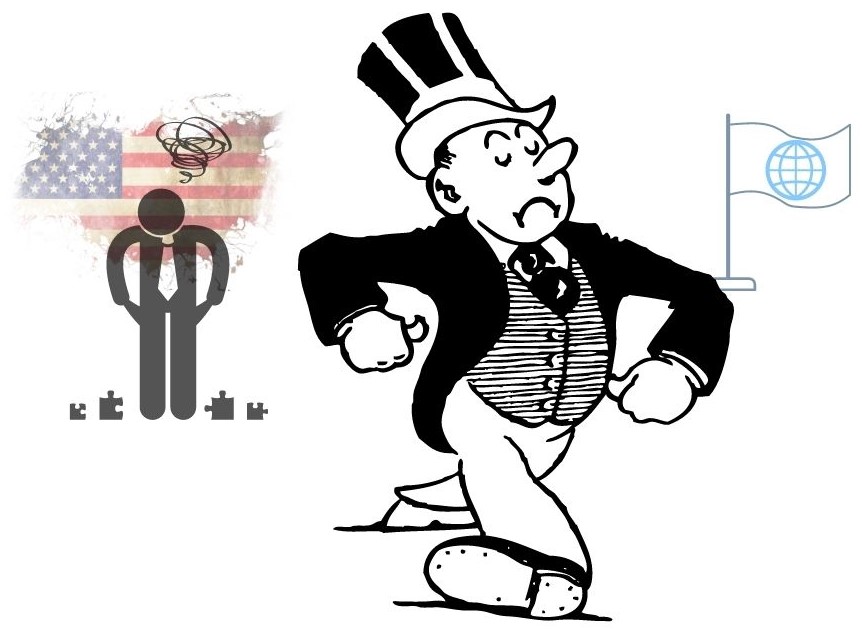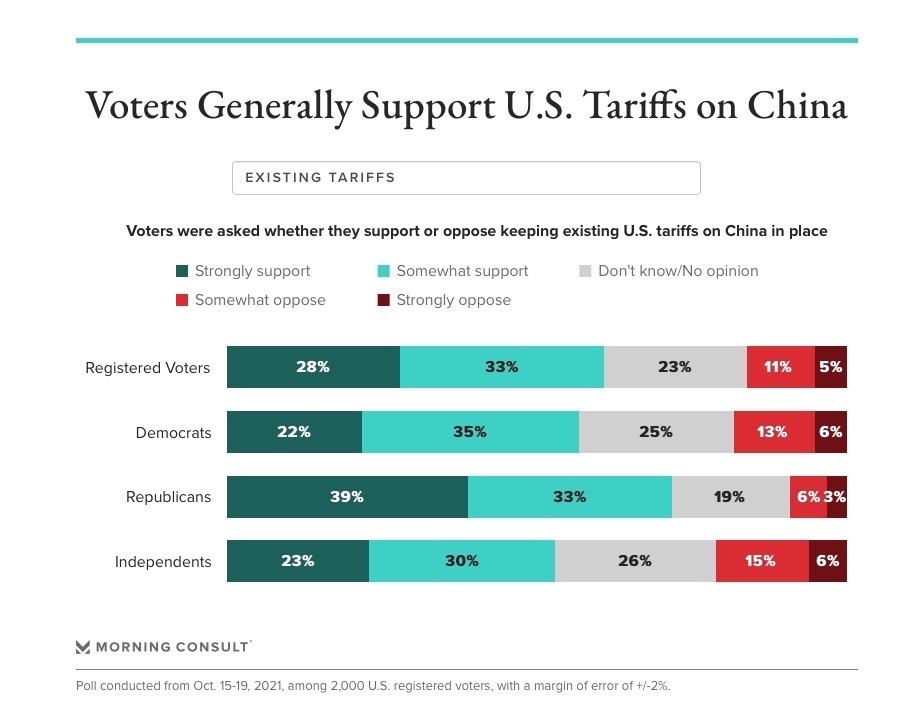After four years of tariffs and trade wars, those who have benefited greatly by running the business of globalization are on the attack. Their efforts favor multinationals sourcing from China to the detriment of the American worker and most U.S. manufacturers.
That the World Trade Organization (WTO) sided with China on free trade matters again recently is no surprise, despite the irony. China, as everyone knows, is the largest closed economy in the world.
WTO making it easier on China’s economy is one thing, but over the last 10 days, dozens of members of Congress, from both parties, are urging the Biden administration to cut tariffs on Chinese imports imposed by the previous government. Some, like Senator Michael Crapo (R-ID), want it written in law.
 WTO Picks a Winner
WTO Picks a Winner
This week, the WTO gave China the green light to impose retaliatory tariffs on U.S. imports. The ruling by the arbitration panel says China can go ahead and put tariffs on some $645 million worth of imports from the U.S. following a ruling on a 2012 case regarding Chinese subsidies on solar panels and steel pipe.
That total is more than double what the U.S. currently has in place in the Section 301 tariffs, which began in the Trump presidency. CPA hopes the Biden administration ignores this ruling. Tariffs are the only leverage the U.S. has in negotiating trade relations with China.
The WTO ruled against the Section 301 tariffs, too, but the U.S. ignored them. President Biden has left them untouched.
The fact that the WTO granted a two-fold increase over existing tariffs in place against China-made imports should be felt like a slap in the face to any member of Congress representing U.S. manufacturing, including states where solar manufacturing is making a comeback, including Georgia and Ohio.
“This sham of an international organization is a major barrier to rebalancing harmful global trade imbalances and to national economic development efforts in the U.S. that seek to rebuild domestic industries and jobs after decades of unfair trade practices from China,” said Michael Stumo, CEO of CPA.
Sadly, many members of Congress seem keen on giving China a break.
Congress Picks a Side
Removing tariffs benefit China’s labor force and manufacturing base – long geared up to serve Western consumers. But removing tariffs mostly benefits large importers. The International Trade Commission pointed this out last spring. Big corporations benefit most from low-tariffs and global trade.
For now, solar is the most pressing example. The WTO ruling could convince Biden he has to go against U.S. domestic solar producers.
President Biden has until February 6 to decide whether to keep the Section 201 tariffs on solar products, most of them made in China and Southeast Asia. The four-year old tariffs helped increase investment in domestic solar manufacturing by American companies and South Korean multinationals like LG and Hanwha Q Cells, both investing in Georgia. Even China’s Jinko Solar set up shop in Florida because of tariffs.
Some Senators want those tariffs removed completely.
On January 20, Senator Jacky Rosen (D-NV) and Jerry Moran (R-KS) urged Biden in a letter to remove solar tariffs. Eight senators signed on, including those long supportive of China like Senator Diane Feinstein (D-CA).
“We hold China as a potential trading partner, as a country that has pulled tens of millions of people out of poverty in a short period of time, and as a country growing into a respectable nation amongst other nations. I deeply believe that.” – Sen. Diane Feinstein, July 30, 2020.
The push to remove solar tariffs is being led by the Solar Energy Industries Association. SEIA mainly represents engineering and construction firms that design and install commercial and utility-scale solar using imported panels. None of these people would go out of business if they purchased American-made panels. But without tariffs, American-made solar would have likely ceased to exist, as is the case in Europe.
In short, tariffs haven’t put the installers out of business, and it helped American manufacturers move the U.S. closer to solar sustainability and self-reliance. Removal of tariffs would hurt those manufacturers, but installers might get more demand for cheap imports. So the installers get more jobs, perhaps, and U.S. manufacturers lose jobs. All the while, the U.S. solar supply chain returns to becoming wholly dependent on imports.
It’s not just solar tariffs Congress wants to remove. It’s all tariffs on China.
House Democrats and Republicans are urging the White House to gut Section 301 tariffs. If Biden did that, it would greatly roll back the trade war era and bring the U.S.-China relationship on path to pre-2016. Reps. Darin LaHood (R-IL), Jackie Walorski (R-IN), Ron Kind (D-WI), and Suzan DelBene (D-WA) sent a letter to Katherine Tai “to immediately expand its exclusion process” to those tariffs.
Lahood and the 140 others who signed onto the letter said those tariffs hurt small business, an emotional argument meant to disguise who really benefits from them – big business – a group for which the electorate will rarely shed a tear.
It is just as likely that small businesses – many of them deemed “unessential” over the last two years due to Covid restrictions — are hurt more by supply chain disruptions from China than paying 25% more due to tariffs.
House Minority Leader Kevin McCarthy (R-CA) attached his name to the letter, unsigned.
The removal of Section 301 tariffs or the weakening of them through rapid-fire exclusions granted to company after company, would set the table for the weakening of other China policies. Some Senators like Mike Crapo of Idaho want to make this law.
The Senate’s U.S. Innovation and Competition Act includes a provision – Division G: Trade Act of 2021 – that also guts the Section 301 tariffs. House Ways and Means is debating this issue now and wants this provision removed from their version of the bill.
These recent letters to Tai and to Biden show there are powerful interests moving fast to end the trade war era with China. It’s a return to the more kumbaya, globalist, corporate vision of the world economy that voters increasingly reject.
 Unintended Consequences of Removing the Trade War Tariffs
Unintended Consequences of Removing the Trade War Tariffs
The weakening of Section 301 tariffs sets the table for granting exclusions to companies currently on the Commerce Department’s Entity List. U.S. companies that want to do business with Entity List companies need government permission.
Weakening Section 301 tariffs would possibly put a stop to capital markets sanctions, which forced the likes of BlackRock, Vanguard, and State Street to sell their shares of Chinese military companies. Wall Street would want to partake in any weaker China position in Washington.

A staffer on Capitol Hill shows us his mask, handed out this month to those working in the House of Representatives.
All of this – removing solar safeguards, weakening the 301s — threatens to put America’s China policies on hold.
For sectors of the new green tech economy, a focus of the Biden presidency, it would place the onus on subsidy programs that often require congressional votes. Worse yet, these programs will never be able to out-subsidize or under-tax the Chinese competition. With less 10 months to go before mid-term elections, members of Congress should rethink their fealty to multinationals who have become happily dependent on China at the expense of American labor and manufacturing.
The views of the WTO, and these pro-China legislators are not popular.
An October survey by Morning Consult showed that 61% of U.S. voters, including 57% of Democrats, support keeping tariffs in place. Moreover, 49% of voters support even more tariffs on mainland China manufactured goods, with a whopping 72% of Republicans in support of an increase.
Perhaps even more ridiculous than promoting more support for China imports in written letters is the recent (China) mask mandate. Earlier this month, the Office of the Attending Physician distributed KN95 masks made in China to House lawmakers.
CPA sent a letter to the White House urging House leaders to stick to Biden’s promise to Buy American when it comes to critical medical supplies.
WTO, Sen. Crapo, Rep. Rosen, Minority Leader McCarthy & More, Unite in China’s Favor
After four years of tariffs and trade wars, those who have benefited greatly by running the business of globalization are on the attack. Their efforts favor multinationals sourcing from China to the detriment of the American worker and most U.S. manufacturers.
That the World Trade Organization (WTO) sided with China on free trade matters again recently is no surprise, despite the irony. China, as everyone knows, is the largest closed economy in the world.
WTO making it easier on China’s economy is one thing, but over the last 10 days, dozens of members of Congress, from both parties, are urging the Biden administration to cut tariffs on Chinese imports imposed by the previous government. Some, like Senator Michael Crapo (R-ID), want it written in law.
This week, the WTO gave China the green light to impose retaliatory tariffs on U.S. imports. The ruling by the arbitration panel says China can go ahead and put tariffs on some $645 million worth of imports from the U.S. following a ruling on a 2012 case regarding Chinese subsidies on solar panels and steel pipe.
That total is more than double what the U.S. currently has in place in the Section 301 tariffs, which began in the Trump presidency. CPA hopes the Biden administration ignores this ruling. Tariffs are the only leverage the U.S. has in negotiating trade relations with China.
The WTO ruled against the Section 301 tariffs, too, but the U.S. ignored them. President Biden has left them untouched.
The fact that the WTO granted a two-fold increase over existing tariffs in place against China-made imports should be felt like a slap in the face to any member of Congress representing U.S. manufacturing, including states where solar manufacturing is making a comeback, including Georgia and Ohio.
“This sham of an international organization is a major barrier to rebalancing harmful global trade imbalances and to national economic development efforts in the U.S. that seek to rebuild domestic industries and jobs after decades of unfair trade practices from China,” said Michael Stumo, CEO of CPA.
Sadly, many members of Congress seem keen on giving China a break.
Congress Picks a Side
Removing tariffs benefit China’s labor force and manufacturing base – long geared up to serve Western consumers. But removing tariffs mostly benefits large importers. The International Trade Commission pointed this out last spring. Big corporations benefit most from low-tariffs and global trade.
For now, solar is the most pressing example. The WTO ruling could convince Biden he has to go against U.S. domestic solar producers.
President Biden has until February 6 to decide whether to keep the Section 201 tariffs on solar products, most of them made in China and Southeast Asia. The four-year old tariffs helped increase investment in domestic solar manufacturing by American companies and South Korean multinationals like LG and Hanwha Q Cells, both investing in Georgia. Even China’s Jinko Solar set up shop in Florida because of tariffs.
Some Senators want those tariffs removed completely.
On January 20, Senator Jacky Rosen (D-NV) and Jerry Moran (R-KS) urged Biden in a letter to remove solar tariffs. Eight senators signed on, including those long supportive of China like Senator Diane Feinstein (D-CA).
The push to remove solar tariffs is being led by the Solar Energy Industries Association. SEIA mainly represents engineering and construction firms that design and install commercial and utility-scale solar using imported panels. None of these people would go out of business if they purchased American-made panels. But without tariffs, American-made solar would have likely ceased to exist, as is the case in Europe.
In short, tariffs haven’t put the installers out of business, and it helped American manufacturers move the U.S. closer to solar sustainability and self-reliance. Removal of tariffs would hurt those manufacturers, but installers might get more demand for cheap imports. So the installers get more jobs, perhaps, and U.S. manufacturers lose jobs. All the while, the U.S. solar supply chain returns to becoming wholly dependent on imports.
It’s not just solar tariffs Congress wants to remove. It’s all tariffs on China.
Lahood and the 140 others who signed onto the letter said those tariffs hurt small business, an emotional argument meant to disguise who really benefits from them – big business – a group for which the electorate will rarely shed a tear.
It is just as likely that small businesses – many of them deemed “unessential” over the last two years due to Covid restrictions — are hurt more by supply chain disruptions from China than paying 25% more due to tariffs.
House Minority Leader Kevin McCarthy (R-CA) attached his name to the letter, unsigned.
The removal of Section 301 tariffs or the weakening of them through rapid-fire exclusions granted to company after company, would set the table for the weakening of other China policies. Some Senators like Mike Crapo of Idaho want to make this law.
The Senate’s U.S. Innovation and Competition Act includes a provision – Division G: Trade Act of 2021 – that also guts the Section 301 tariffs. House Ways and Means is debating this issue now and wants this provision removed from their version of the bill.
These recent letters to Tai and to Biden show there are powerful interests moving fast to end the trade war era with China. It’s a return to the more kumbaya, globalist, corporate vision of the world economy that voters increasingly reject.
The weakening of Section 301 tariffs sets the table for granting exclusions to companies currently on the Commerce Department’s Entity List. U.S. companies that want to do business with Entity List companies need government permission.
Weakening Section 301 tariffs would possibly put a stop to capital markets sanctions, which forced the likes of BlackRock, Vanguard, and State Street to sell their shares of Chinese military companies. Wall Street would want to partake in any weaker China position in Washington.
A staffer on Capitol Hill shows us his mask, handed out this month to those working in the House of Representatives.
All of this – removing solar safeguards, weakening the 301s — threatens to put America’s China policies on hold.
The views of the WTO, and these pro-China legislators are not popular.
An October survey by Morning Consult showed that 61% of U.S. voters, including 57% of Democrats, support keeping tariffs in place. Moreover, 49% of voters support even more tariffs on mainland China manufactured goods, with a whopping 72% of Republicans in support of an increase.
Perhaps even more ridiculous than promoting more support for China imports in written letters is the recent (China) mask mandate. Earlier this month, the Office of the Attending Physician distributed KN95 masks made in China to House lawmakers.
CPA sent a letter to the White House urging House leaders to stick to Biden’s promise to Buy American when it comes to critical medical supplies.
MADE IN AMERICA.
CPA is the leading national, bipartisan organization exclusively representing domestic producers and workers across many industries and sectors of the U.S. economy.
TRENDING
Economic View: Leading Economists Turn Against Free Trade – “A Flawed Game”
CPA Strongly Supports New Solar Trade Case Filed by Major U.S. Solar Manufacturers
Mexico and China Trade Problems Mounting, Senator Sherrod Brown, Others on Finance Committee Say
Katherine Tai Chastised By Farm State Senators Over Market Access, Free Trade Deals
DMSI Rises Slightly in Q4 2023
The latest CPA news and updates, delivered every Friday.
WATCH: WE ARE CPA
Get the latest in CPA news, industry analysis, opinion, and updates from Team CPA.
CHECK OUT THE NEWSROOM ➔